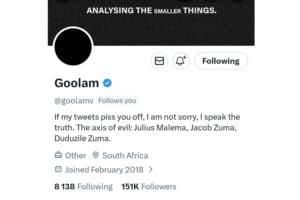The party says it can't celebrate this day because it isn't Economic Freedom Day and the president is endorsed by the markets and private capital.

In a statement on Saturday, a public holiday marking 25 years since South Africa went to the polls in the first democratic elections, the EFF reiterated long-held views that the country remains unfree.
The party’s spokesperson, Mbuyiseni Ndlozi, said they recognised the important milestone of 1994 and the granting of the vote to all adult citizens, but bemoaned the ongoing status quo that has seen 72% of privately owned land still in the hands of white people, according to the EFF.
The party also criticised the slow pace of land reform under the ANC government, leaving black Africans as “landless visitors in the country of their birth”.
The EFF would therefore not be celebrating freedom, as doing so would be disingenuous.
Ndlozi also touched on persistent unemployment in the country, with youth unemployment among black South Africans a major challenge.
He expressed the opinion that government had no plan to deal with either landlessness or joblessness, with inequality continuing to widen.
The EFF then said society needed to be “deeply worried” that so-called white monopoly capital interests had endorsed President Cyril Ramaphosa, which the EFF took as evidence that Ramaphosa was “their project” to allegedly protect the status quo.
This week, the influential international magazine The Economist endorsed Ramaphosa for the upcoming elections.
They analysed the situation in a way similar to a number of local academics, including Prof Steven Friedman, who has said that a strong showing for the ANC at the polls would bolster Ramaphosa’s ability to weed out rogue and criminal elements in the ANC and create a cleaner and more capable state.
By contrast, if the ANC under his leadership did not attract a significant majority, The Economist expressed the fear that it would strengthen the hand of the so-called Jacob Zuma faction in the party, at Ramaphosa’s expense, and the party may be forced into a coalition with the EFF.
The Economist’s latest edition described Ramaphosa as the man best positioned to continue with the legacy of Nelson Mandela and grow the “rainbow nation” according to its full potential, putting the nine “wasted Zuma years” behind it.
In the last election, the magazine calculated that the best vote for an Economist reader would be the DA.
Time Magazine recently also included Ramaphosa on a list of the most influential people in the world.
Ndlozi called on the electorate to rather turn May 8 into “Economic Freedom Day” and choose his party as an alternative to the ANC.
For more news your way, download The Citizen’s app for iOS and Android.






